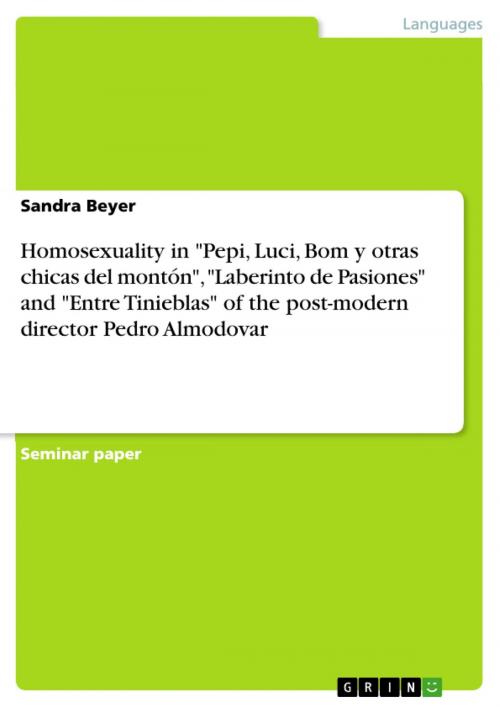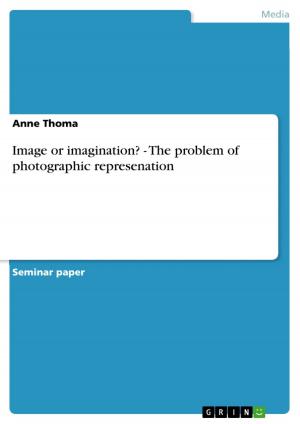Homosexuality in 'Pepi, Luci, Bom y otras chicas del montón', 'Laberinto de Pasiones' and 'Entre Tinieblas' of the post-modern director Pedro Almodovar
Nonfiction, Reference & Language, Foreign Languages, Spanish| Author: | Sandra Beyer | ISBN: | 9783638278713 |
| Publisher: | GRIN Publishing | Publication: | May 26, 2004 |
| Imprint: | GRIN Publishing | Language: | English |
| Author: | Sandra Beyer |
| ISBN: | 9783638278713 |
| Publisher: | GRIN Publishing |
| Publication: | May 26, 2004 |
| Imprint: | GRIN Publishing |
| Language: | English |
Seminar paper from the year 2004 in the subject Romance Languages - Spanish Studies, grade: 1,3 (A), Kingston University London (Spanish Institute), course: Spanish Cinema, language: English, abstract: Introduction Almodovar's first three films Pepi, Luci, Bom y otras chicas del montón (1980), Laberinto de Pasiones (1982) and Entre Tinieblas (1983) can be seen as a breaking of all the taboos that were forbidden under Franco's regime: there is drug use, 'abnormal' sexuality, crude language, adultery, religious blasphemy. The films clearly mirror the new freedoms enjoyed by a generation of film-makers belonging to Spain's 'la movida' movement of the late 1970's and early 1980's. Born in 1951, Almodovar mainly grew up in the rural Extremadura, but left for Madrid at the age of sixteen. He originally wanted to attend the national film school, but due to the closure of the school by the Dictator Franco's repressive government he was unable to go. He instead took a job at a telephone company to make the money to buy himself a Super-8 camera. Almodovar began filming short films in the early 1970s, and quickly became associated with 'la movida'. This essay will be evaluating Almodovar's role as a post-modern director, including a brief demonstration of the development of the post-modern culture after Franco's death. The essay is especially interested in the juxtaposition of homo- and heterosexuality in Almodovar's films and will evaluate the different ways in which Almodovar presents homosexuality. It will also have a close look at the mediums Almodovar uses to make his audience take his absurd film worlds for granted, and accept the happenings and characters as 'normal'.
Seminar paper from the year 2004 in the subject Romance Languages - Spanish Studies, grade: 1,3 (A), Kingston University London (Spanish Institute), course: Spanish Cinema, language: English, abstract: Introduction Almodovar's first three films Pepi, Luci, Bom y otras chicas del montón (1980), Laberinto de Pasiones (1982) and Entre Tinieblas (1983) can be seen as a breaking of all the taboos that were forbidden under Franco's regime: there is drug use, 'abnormal' sexuality, crude language, adultery, religious blasphemy. The films clearly mirror the new freedoms enjoyed by a generation of film-makers belonging to Spain's 'la movida' movement of the late 1970's and early 1980's. Born in 1951, Almodovar mainly grew up in the rural Extremadura, but left for Madrid at the age of sixteen. He originally wanted to attend the national film school, but due to the closure of the school by the Dictator Franco's repressive government he was unable to go. He instead took a job at a telephone company to make the money to buy himself a Super-8 camera. Almodovar began filming short films in the early 1970s, and quickly became associated with 'la movida'. This essay will be evaluating Almodovar's role as a post-modern director, including a brief demonstration of the development of the post-modern culture after Franco's death. The essay is especially interested in the juxtaposition of homo- and heterosexuality in Almodovar's films and will evaluate the different ways in which Almodovar presents homosexuality. It will also have a close look at the mediums Almodovar uses to make his audience take his absurd film worlds for granted, and accept the happenings and characters as 'normal'.















